Some of Pete's Favorite Natives - Part 1
- Peter F. Strelkow
- May 30, 2022
- 3 min read
Updated: Jan 9, 2023
1. Lignum vitae - Tree of Life

I love this tree for so many reasons. It has beautiful, rare blue flowers, and dainty small leaves. When the flowers are gone, bright orange seed-pods adorn the tree, then open to bright red seeds. It is incredible durable, but very slow. Its small stature and growth habit gives me the ability to prune the trunk into beautiful bonsai-like forms.

2. Taxodium distichum - Bald cypress

Bald Cypress has a timeless appeal to me. This ancient tree can be grown anywhere in our state and most of the country. It is one of the few species that one can easily read the change of seasons in South Florida. Spring is a gorgeous apple green…Summer is a darker olive shade… Fall is yellow ochre fading to brown. An abrupt leaf drop and bareness from a sharp cold snap signal our winter.

3. Bursera simaruba - Gumbo Limbo

Also known as the "Tourist Tree", gumbo limbo is the most iconic South Florida tree. They are tough as nails, provide good summer shade, have fabulous red peeling bark and it grows in everything but wet soil. Plant it, stand back and enjoy it.

4. Acer rubrum - Red Maple

A beautiful temperate tree that can still thrive at the south end of its range. Occasional cold snaps bring out the most beautiful red foliage that is rarely seen in South Florida. They are a lot tougher than most people know and does not need to be in a wetland environment.

5. Pimenta racemosa - West Indian Bay

Ok… this is not a native, but I couldn't help myself. The deliciously aromatic leaves of this Caribbean native along with its brother Allspice (Pimenta dioica) are simply show stoppers. For the garden, this tree proves extremely tough and will typically will grow vertically while holding its dark green, fragrant leaves. Crush a leaf between your fingers to appreciate the amazing aroma.

6. Psuedophoenix sargentii - Buccaneer Palm

This Keys native palm has fine pinnate leaves with beautiful blue-green foliage. It likes it very, very dry and is very slow growing. I like to use them in a grouping of varied heights as a focal point in special locations of interest.
7. Cocothrinax argentata - Silver Palm

Another Keys native that likes dry locations only; this is a very slow-growing palm. It has a silvery-white under leaf. I try to plant them at minimum of 3' tall. One can see hundreds of them in the protected Big Pine Key forests. Their diminutive silver head and slow growth rate make them perfect for small garden spaces.

8. Tilandsia fasciculata and Tilandsia balbisiana - Native air plants

Tilandsia, our best native epiphytic air plants should always be saved and appreciated as they are rapidly disappearing from the wild. I like to move them around trees by dragging the seeds across the furrowed bark of Oak and Cypress trees. They have beautiful red spikes in the spring.

9. Capparis cynophallophora - Jamaica Caper

Jamaica caper is a lovely medium, conical tree with fragrant, pink powder-puff flowers. I use it as a single specimen or a tall buffer planting. It is extremely tough and can take very dry conditions.

10. Psychotria nervosa and Psychotria ligustrifolia - Wild coffee

Terrific shrubs that can take deep shade, full sun and even occasional standing water. I use this as a staple when re-creating native hammocks. Also great for a regular hedge. Shiny, glossy leaves and the flowers always attract Zebra butterflies.









Comments